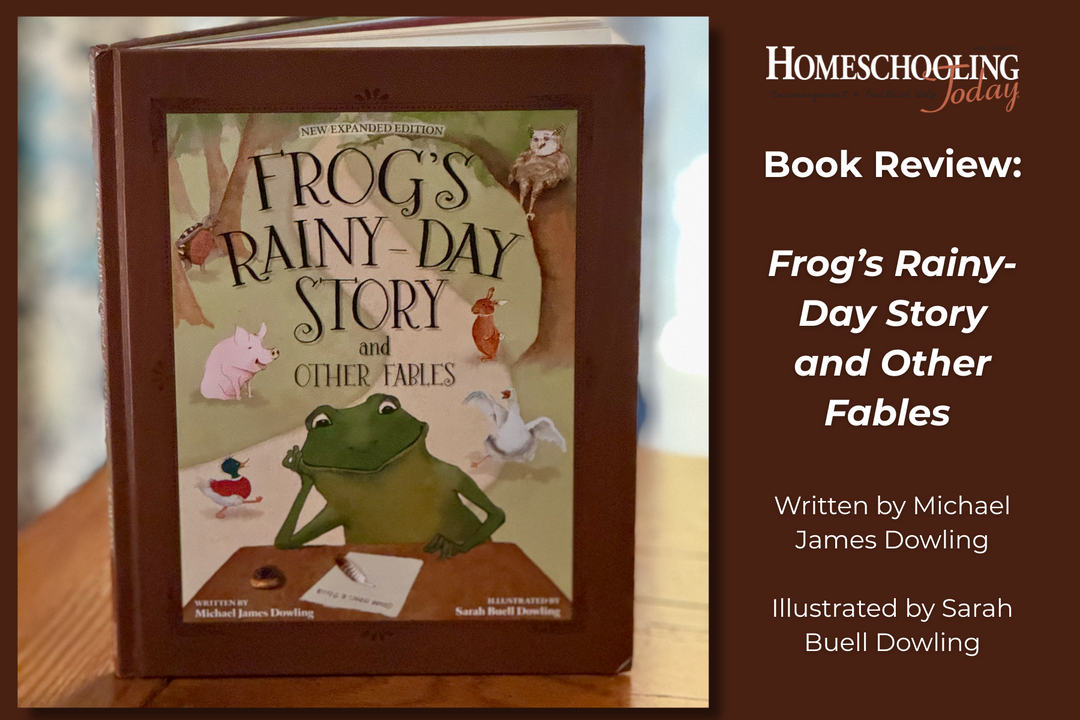What You Need to Know About Self Care as a Homeschool Mom

Are you exhausted, unmotivated, or thinking about putting your kids in public school because you just can’t do it anymore? Maybe the problem isn’t homeschooling.To care for your kids, you have to make self care a priority—but maybe not in the ways you've heard before.
Self-care isn't about getting manicures or going on a retreat. There isn't anything wrong with those things, of course, but they are not what will sustain you in this homeschooling journey. You have to learn what it means to take care of yourself in the day-to-day—the sometimes hard, routine, and wonderful moments of life.
10 Things that Drain Us as Homeschooling Moms
You’ve probably heard the phrase, “You can’t pour from an empty cup.” Common-sense, right? But it often seems we try to do just that. When you drain the liquid out of a cup, you empty it, leaving it dry.
Empty—nothing left, nothing to draw from. Dry—parched, thirsty, in need of hydration.
That is exactly how you feel when you give and give without filling up. And any of the following can be physically, emotionally, or spiritually draining:
- Homeschooling in a way that you dislike
- Unrealistic expectations
- Comparison
- Complaining
- Unresolved conflict
- Lack of support and community
- Neglecting your spiritual life
- Overlooking your physical needs
- Not doing anything that you love and enjoy
- Ignoring your need to learn and grow, too
Filling Your Cup: Self-Care for the Homeschool Mom
Let's address each of those cup-emptying issues with a way to fill up.
1. Homeschool in a Way That Works for Your Kids & YOU
There is so much freedom in homeschooling, yet we tend to forget to enjoy it. Of course different states have different laws regarding the time you must spend homeschooling, what subjects you should cover, and whether you have to be evaluated in some way. But even then you choose the “how” of homeschooling.
When choosing a philosophy of education and the methods you will use, it is important to consider what you believe about how to homeschool. All advice you have probably seen. But it is just as important to think about whether you enjoy teaching in that manner. To ask yourself, “What do I get excited about?”
There are times you’ll choose to do something you don’t particularly enjoy like Jen does when it comes to reading aloud, and Emily who incorporates nature study even though she isn’t the outdoorsy type.
But if homeschooling exhausts you each day because of how you are doing it, you need to rethink your overall plan! That doesn’t mean you have to throw it all out! Simply be ready to adapt as needed.
2. Set Realistic Expectations for Life Beyond Homeschooling
We have to remember our homes do not have to be perfect. Give yourself some grace. Of course there are some standards of cleanliness... we do need clean clothes and dishes! But your home does not have to look like the HGTV Design Home. Learning is often messy. Life is messy. So I’ll say it again: give yourself grace when it comes to taking care of your home.
Maybe you need to talk to your husband and kids about what you all expect and can live with. Have a team meeting to discuss these things and then make a plan. And take heart—when you focus on getting some housework done you aren’t skipping school. Learning to take care of the home is an important lesson each of your children needs to know as well as math, writing, and science.
3. Put Your Blinders On
Blinders are a pair of small leather screens attached to a horse’s bridle to prevent it seeing sideways and behind. We could all use a pair of those! How often do we stray from our path, from the race we are running because we start looking around us?
Theodore Roosevelt once said, “Comparison is the thief of joy.” And that is true. But it is also the thief of time, money, and sanity when you try to duplicate someone else’s life.
When we compare we either puff ourselves up with pride believing we are doing it better (and then we tend to be humbled in some way), or we end up feeling depressed believing we fear we aren't doing enough.
So ask yourself and your family, “Why are we homeschooling?” Then stay true to your reasons for doing it. By knowing your why, you can evaluate each opportunity in light of it and your family’s priorities. It will help you say no to the good so you have time for the best.
4. Cultivate an Atmosphere of Thankfulness
Complaining looks at what we don’t have instead of what we do have. It is a negative response instead of a positive outlook. Complaining says “This isn’t good enough. You aren’t good enough.” Complaining leads to discontent. Now that sounds draining.
Complaining and thankfulness don’t make very good companions. When we or our children are constantly complaining it is exhausting. There are some simple ways you can cultivate an atmosphere of thankfulness in your home:
- Keep a family gratitude journal and have each member record something they are thankful for each morning.
- When you are about to complain, think about something you are thankful for in the same situation. For example, if you begin to complain about all the laundry, stop and say thank you for the fact that you have clothes to wear and for the people who wear them.
- Memorize some verses on thankfulness and even write them on some notecards around your home. (Psalm 106:1; 1 Thessalonians 5:18; Colossians 3:15, 17; Philippians 4:6)
- Model gratitude to your children. Say “thank you” to them for the things they do for you or around the house. Let them hear you say it to those you encounter in life such as people who check out your groceries or wait staff in restaurants.
5. Deal With Conflict
Unresolved conflict and the hurt that often accompanies it leads to bitterness. And nothing will eat at you more than having a root of bitterness in your soul.
- Deal with conflict in a timely manner. Ephesians 4:26–27 says, "Be angry and do not sin; do not let the sun go down on your anger, and give no opportunity to the devil."
- Do what you can to resolve the conflict, but know you can’t control others. We have a choice about our actions when it comes to conflict, and that is our responsibility. "If possible, so far as it depends on you, live peaceably with all"—Romans 12:18. Sometimes we need to ask for forgiveness, and sometimes we have to forgive. And often the situation requires both.
- Remember that forgiving others doesn’t mean you have to put yourself in the same situation again. Forgiving others doesn’t mean we never remember the offense, or that we even trust the other person again. It is about letting go. Letting go of our need for revenge and trusting God in the situation. It’s not holding on to our perceived right to “justice” but instead recognizing the Just One.
6. Find Your People
Community is important; we are designed for it. When we homeschooled we were a part of a small co-op that met for twelve years. Through it we supported one another, encouraged one another, and loved one another. We also learned to deal with conflict and how to work with each other despite our differences. At times, it brought us face-to-face with our own selfishness and sin.
But we also laughed a lot, did things we wouldn’t have done alone, and walked through the homeschooling journey together. We had to choose to believe the best about one another. Choose to trust each other's hearts.
You may have to be creative, and you may have to step out of your comfort zone, but find or create your own community. Whether through a co-op or your church or a group you put together that goes on field trips and does fun projects—we really are better together.
7. Nurture Your Heart
How will we ever reach the hearts of our children if we neglect our own? Grafting is a gardening term where a smaller stem of one plant is inserted and fixed to the stock of another plant selected for its strong roots.
As homeschooling moms, we need to be grafted into the One who is our source of life, strength, and growth. Then we will be able to give our children what they really need. As John 15:5 says, "I am the vine; you are the branches. Whoever abides in me and I in him, he it is that bears much fruit, for apart from me you can do nothing."
Homeschooling is hard work. It requires patience, intentionality, humility, love, and a good sense of humor. There are simply times we want to quit. But God is there to strengthen you. You may feel you don’t have time, but it is essential to make time for your relationship with God.
8. Take Care of Your Health
This may be the one thing we neglect the most as homeschooling moms. We always think we will do it later. But the cornerstones of health—eating well, exercising, and getting enough rest—are essential to keeping your cup full. It doesn’t need to be complicated to be effective.
- Eat real food. We try to follow these guidelines: As much as is possible, eat real food. The less processed the better. Lots of veggies, some fruit, whole grains, real butter, olive oil and coconut oil. And yes, we eat meat (y’all, I live in Texas. I think it's the law). We limit sugar and use pure stevia or honey for the most part.
- Move everyday. Whether it is playing with your kids at a park, taking a nature walk, or investing in an exercise video and doing it (I like Leslie Samson’s at home walking videos), incorporating movement each day or some form of exercise three times a week can really make a big difference.
- Rest. You may have to get creative, and it will look different in the various seasons of your life. But you need rest. Though you may find it difficult, there is a lot of wisdom in setting aside one day a week to rest.
9. Include Activities You Enjoy
I love to read, so each day as my children did their daily individual reading, I grabbed a book and read too. Could I have used that time to pick up the house or do some laundry? Yes. But I chose to make something I enjoyed a priority during the day. We would sit in the same room, each snuggled in our own blankets, and read. There was value in my kids seeing that, and there was value for me personally. I call that a win/win situation!
10. Continue to Learn & Grow
One of the joys of homeschooling is learning alongside of our children. But what about something YOU want to learn? When we choose to learn something new for ourselves, we are modeling an important lesson: life-long learning.
Take an online course, figure out how to do something you’ve always wanted to do, give yourself permission to take time for your interests and passions. You are modeling an important lesson for your children as well as taking care of yourself.
Self Care is a Preventative Measure
Burnout, irritability, frustrations, exhaustion—you’ve probably experienced at least one of these. And if you haven’t there is a good chance you will at some point in your homeschooling journey. That is why self-care must be a priority.
Unfortunately, we often seem to associate self care with selfishness. But that is simply not true. It is one of the most loving things you can do for your family.












